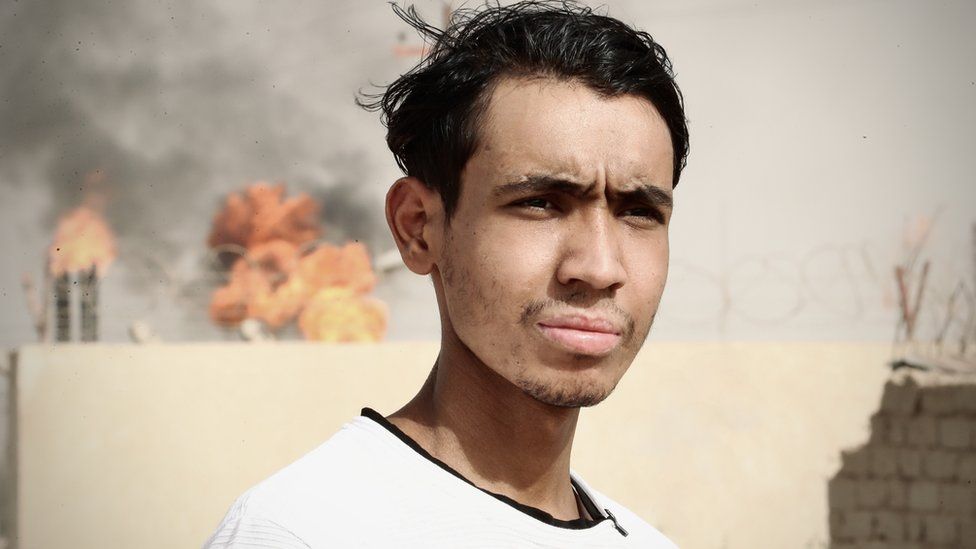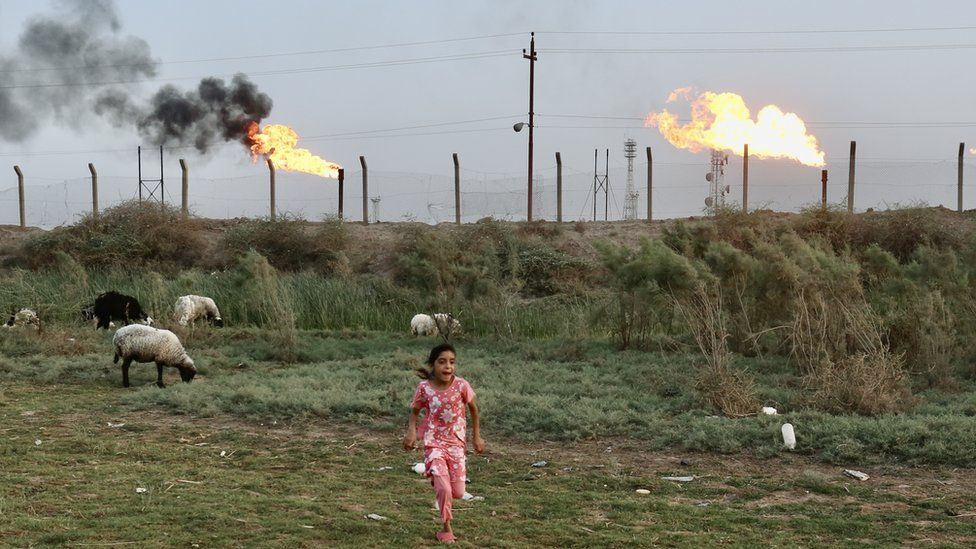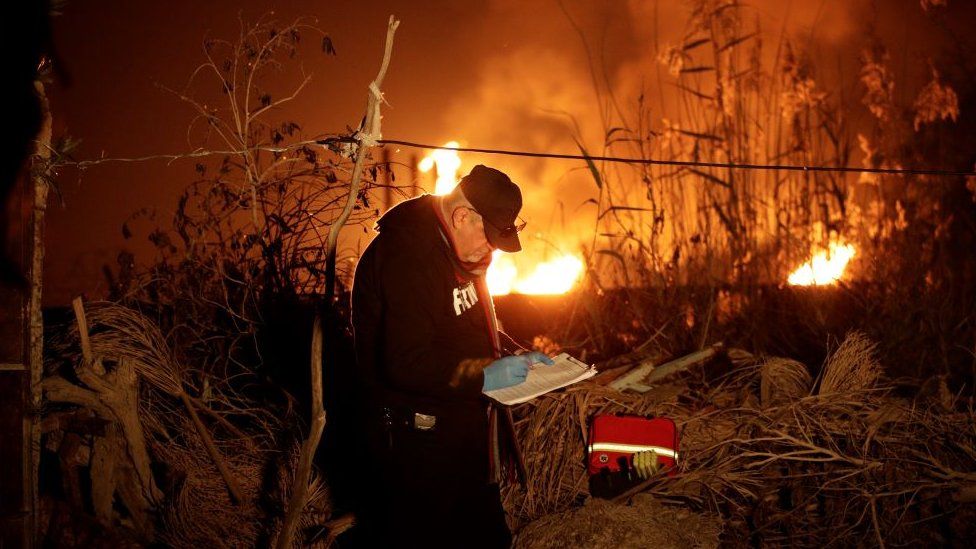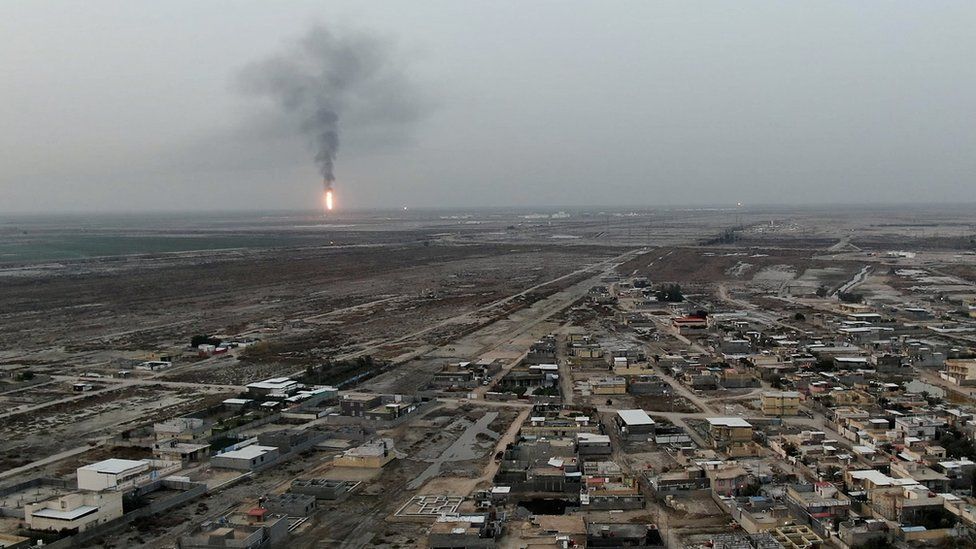 Hussein Faleh/BBC News
Hussein Faleh/BBC NewsMajor oil companies are not declaring a significant source of greenhouse gas emissions, a BBC News investigation has revealed.
The BBC found millions of tonnes of undeclared emissions from gas flaring at oil fields where BP, Eni, ExxonMobil, Chevron and Shell work.
Flaring of natural gas is the “wasteful” burning of excess gas released during oil production.
The companies said their reporting method was standard industry practice.
Flared gases emit a potent mix of carbon dioxide, methane and black soot which pollute the air and accelerate global warming.
The BBC has also found high levels of potentially cancer-causing chemicals in Iraqi communities near oil fields where there is gas flaring. These fields have some of the highest levels of undeclared flaring in the world, according to our findings.
In response, David Boyd, UN special rapporteur on human rights and the environment, compared these communities to “modern sacrifice zones, areas where profit and private interests are prioritised over human health, human rights and the environment”.

Under Poisoned Skies
The deadly impact of the oil giants’ toxic air pollution on children and the planet is revealed in this BBC News Arabic investigation from the front line of climate change in Iraq.
The documentary is available to watch now on BBC iPlayer (UK only) and is also being broadcast on BBC World News at 08:10 GMT on Saturday 1 October.

Companies have long recognised the need to eliminate all but emergency flaring.
BP, Eni, ExxonMobil, Chevron and Shell are committed to a 2015 World Bank pledge to declare and end routine flaring by 2030 – in Shell’s case by 2025.
But the companies say that where they have contracted with another company to run day-to-day operations, it is that other firm’s responsibility to declare flaring emissions.
Such fields are a major part of oil production – accounting for 50% of these five companies’ portfolios, on average.
However, through months of analysis the BBC found dozens of oil fields where these operators are not declaring the emissions either, meaning no-one is.
Using World Bank flare-tracking satellite data, we were able to identify the emissions from each of these sites. We estimate that in 2021, almost 20 million tonnes of CO2 equivalent went unreported from these flares. That is equal to the greenhouse gas emissions 4.4 million cars would produce in a year.
In response, all five firms said that the approach to reporting emissions only from the sites they directly operate was standard industry practice.
Shell and Eni additionally said that they do give an overall emissions figure which includes flaring from non-operated sites, but said this is not broken down or included in their World Bank pledge to cut emissions.
A BBC News Arabic investigation indicates that flaring increases the risk of some cancers for people living near oil fields in Iraq.
People living in some of the world’s biggest oil fields in Basra, south-east Iraq – Rumaila, West Qurna, Zubair and Nahran Omar – have long suspected that childhood leukaemia is on the increase, and that flaring is behind it.

In the Basra region, new cases of all types of cancer rose by 20% between 2015 and 2018, according to a leaked Iraq Health Ministry report seen by BBC News Arabic. It blames air pollution.
BP and Eni are the lead contractors at Rumaila and Zubair oil fields respectively, but as they are not the operators they do not declare the emissions. Neither do the sites’ operators.
BBC News Arabic worked with environment and health experts near the four sites in 2021 to test for cancer-causing chemicals associated with flaring over two weeks.
The air tests indicated levels of benzene, linked to leukaemia and other blood disorders, reached or exceeded Iraq’s national limit in at least four places.
Urine samples we collected from 52 children indicated that 70% had elevated levels of 2-Naphthol, a form of the possibly cancer-causing substance naphthalene.
Dr Manuela Orjuela-Grimm, professor of childhood cancer at Columbia University, said: “The children have strikingly high levels … this is concerning for [their] health and suggests they should be monitored closely.”

When she was 11, Fatima Falah Najem was diagnosed with a type of blood and bone cancer called acute lymphoblastic leukaemia. Exposure to benzene can increase the risk of people developing this condition.
Fatima lived with her parents and six siblings near Zubair oil field, where Eni is the lead contractor.
Neither Eni nor Zubair’s operating company declare flaring emissions there.
For health reasons, Iraqi law prohibits flaring within six miles (10 km) of people’s homes.
But the flares in Zubair blaze almost continuously, just 1.6 miles from the family’s front door.
Fatima drew the “fiery flames” that surrounded her home, during her chemotherapy treatment.
She told us she enjoyed watching them at night, and came to normalise them.
But for her father, watching her get sick was “like being on fire without being able to extinguish it”.
Fatima died last November as her family desperately sought a bone marrow transplant. She was 13.

Asked for a response, Eni said it “strongly rejects any allegation that its own activities are endangering the health of the Iraqi people”.
Eni said that it does not contractually have responsibility for flaring in Zubair.
Rumaila oil field, 25 miles away, flares more gas than any other site in the world, according to BBC calculations – enough to power nearly three million UK homes a year.
BP is the lead contractor – it helped establish and now supervises the operator, Rumaila Operating Organisation (ROO). Neither declares any flaring from the oil field.
ROO’s operating standards, which BP signed, say: “Those who are impacted by pollution levels that exceed national limits are legally entitled to compensation.”
But Ali Hussein Julood, a 19-year-old leukaemia survivor, says that he and his father were met with silence when they sought compensation from BP in 2020 and 2021.
BP said: “We are extremely concerned by the issues raised by the BBC – we will immediately review those concerns.”
On the leaked report on cancer in the Basra area, Iraq’s Oil Minister Ihsan Abdul Jabbar Ismail told us: “We instructed all the contracted companies operating in the oil fields to uphold international standards.”
If all the natural gas flared globally were captured and used it could replace more than nine-tenths of Europe’s gas imports from Russia, based on figures from the International Energy Agency.

Capturing the gas can be initially expensive and technically difficult, according to the World Bank. It estimates that ending all routine flaring could cost as much as $100bn (£92bn).
But Mark Davis, chief executive of Capterio, which advises oil companies on capturing flared gas, told the BBC that countries like Norway have shown it is possible with the help of strong regulation.
Additional support from: Becky Dale and Christine Jeavans (Data & Analysis)








